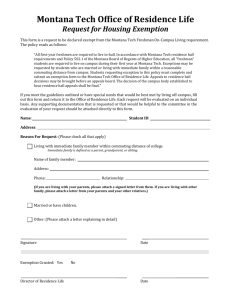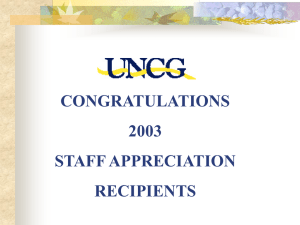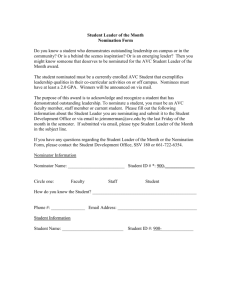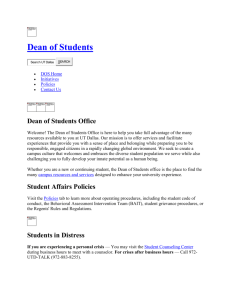Student Life Programs Emergency Procedures Manual
advertisement
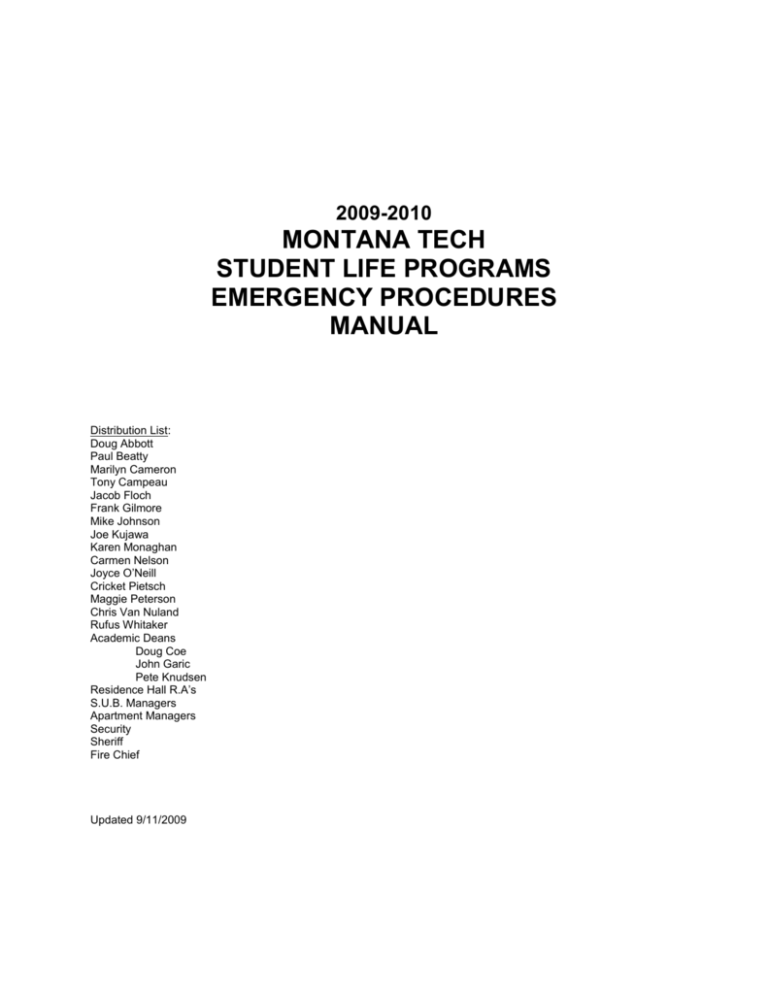
2009-2010 MONTANA TECH STUDENT LIFE PROGRAMS EMERGENCY PROCEDURES MANUAL Distribution List: Doug Abbott Paul Beatty Marilyn Cameron Tony Campeau Jacob Floch Frank Gilmore Mike Johnson Joe Kujawa Karen Monaghan Carmen Nelson Joyce O’Neill Cricket Pietsch Maggie Peterson Chris Van Nuland Rufus Whitaker Academic Deans Doug Coe John Garic Pete Knudsen Residence Hall R.A’s S.U.B. Managers Apartment Managers Security Sheriff Fire Chief Updated 9/11/2009 EMERGENCY MENTAL AND PHYSICAL HEALTH PROCEDURES INTRODUCTIONS: These procedures should be used in situations where a Mental and/or Physical Health Emergency is encountered involving a student. Mental Health Emergency is broadly defined as any situation in which a student behaves in such a way (verbal threats or physical action) that there is a concern that he/she may do harm to self or others or displays behavior that indicates obvious and possibly harmful irrationality. A Physical Health Emergency exists when immediate medical attention appears necessary as a result of accident, assault or illness. An acute emergency involves immediate, imminent danger to self or others. Such initial determination will be left to the judgment of Student Life Staff directly involved. This could include any of the professional staff or student RA’s in consultation with a professional staff member. In cases of acute emergencies in the residence hall, the R.A. may be required to deal with the situation directly. In general, information involving Mental Health Emergencies is confidential. Care should be taken to involve only those people necessary and to protect the student’s confidentiality. Confidentiality should be breached only in acute emergencies where the student is putting self or others in immediate imminent danger. In all cases, staff members should make clear to others directly involved (staff and students) the perimeter of confidentiality in the situation, (i.e.: what should be kept confidential and what can be released and revealed). Serious crimes include acquaintance rape or date rape. Date rape is a crime committed against one person (usually a woman) by another (usually a man) in which sex is the weapon. Whether physical force or emotional coercion is used, sex without consent is still considered to be rape. Montana Tech is committed to assisting any student, who reports having been victimized by referring the student to the appropriate source for security, medical attention, emotional support and civil, criminal and/or College conduct proceedings. The following procedures are to be used when an emergency situation is encountered: 1. 2. The Student Life Staff Member with initial contact should notify one of the following individuals: a. If the student is in the Residence Hall or Family Housing, situations should be reported to the Associate Vice Chancellor for Student Affairs/Dean of Students by the Director of Residence Life; or in his/her absence, by an R.A. If the situation is encountered first by an R.A., he/she should report immediately to the Director of Residence Life, if that person is available. If encountered by an R.A. and neither the Director of Residence Life nor the AVC/Dean of Students is available, one or more of the following resource persons should be contacted: VC of Development & Student Services, VC for Academic Affairs, Chancellor, Environmental Health & Safety Coordinator, Director of Student Union/Student Activities, Director of Physical Facilities, and/or Campus Security; depending on the nature of the situation. If a weapon is involved wherein an individual is threatening himself or others, call the Butte-Silver Bow Sheriff Department and Security immediately. b. If the student is not in the Residence Hall or Family Housing, the report should be made to the AVC/Dean of Students or the Vice Chancellor of Development & Student Services. In the absence of the AVC/Dean of Students and the VC of Development & Student Services, the report can be made to any of the following: VC for Academic Affairs, Environmental Health & Safety Coordinator, Director of Residence Life, Counselors, Director of the Student Union/Student Activities, or Campus Security. If the emergency involves a violation of Montana Criminal Law or a campus regulation relating to life and safety, Security and Butte police must be informed immediately. For emergencies occurring in the Student Union Building, the Director of the Student Union/Student Activities should be contacted in accordance with Student Union emergency procedures and in accordance with the procedures defined in this document. In all mental health emergency situations, the AVC/Dean of Students is to be notified as soon as possible. With regard to Mental Health Emergencies, the professional staff member involved should attempt to communicate as soon as possible with the AVC/Dean of Students or in his/her absence to the VC of Development & Student Services, and involve one or both of them in the proceedings. Their direct involvement may be necessary and/or any significant background information they may provide may be helpful. Emergency Mental and Physical Health Procedures Page 2 With regard to rape and acquaintance rape, survivors (we use the word survivor in place of victim because survivor reflects the courage that the woman had to survive the attack) should seek medical attention, even if she/he is not physically injured. Medical attention is available at St. James Hospital emergency room, Tech’s Health Center or a private physician. Survivor’s should not bathe, shower, douche, or change clothes before the medical exam. Treatment for sexual assault may include testing for sexually transmitted diseases, medication to prevent pregnancy and documentation so the survivor can decide later whether to prosecute. It is the survivor’s decision to report the assault to the Butte Police or Campus Security, a decision that is encouraged and has the complete support of Montana Tech. If the survivor decides not to report the assault, you and/or the survivor are strongly advised to contact the Dean of Students to discuss options. Remember, most individuals who assault are repeaters and your report may prevent an attack on another person. 3. An assessment of the situation should be made by the professional Student Life Staff involved (AVC/Dean of Students, Director of Residence Life, Counselors). If it is believed circumstances warrant, arrangements should be made for hospitalization of the student. 4. In the event mental health hospitalization is required, Campus Security should be notified and the necessary arrangements made. The involvement of the Butte-Silver Bow Sheriff’s Office may also be necessary. Additionally, the resources of the following Butte mental health professional/ agencies may be required to facilitate the procedures: Mental Health, Safe Space, Butte Silver-Bow County Chemical Dependency Service (see attached directory information). Campus Security should be contacted in instances of physical health hospitalization. 5. As soon as possible, a decision must be made regarding the length of hospitalization and/or whether or not commitment proceedings should be initiated. Committal procedures should be used only after all other alternatives have been exhausted. If the College is the initiating party, the AVC/Dean of Students and/or the Chancellor and Campus Security must be involved. 6. In an acute emergency situation, it may be necessary for the first person directly involved with the situation to call Campus Security. In instances of acute physical health emergency, call 911 and then Campus Security should be called immediately. In such circumstances, the AVC/Dean of Students and VC of Development & Student Services or his/her appropriate designee must be contacted as soon as possible. 7. Students in need of emergency treatment should be treated on a voluntary basis. If a student refuses treatment, a professional staff member should make the decision as to whether the student is capable of a rational decision and should supersede in the event that in his/her professional judgment the involved student is incapable of making a rational decision concerning his/her welfare. 8. The decision to inform the parents of the student may involve the student’s right of privacy. Police and medical officials have their own policies in this regard and this Montana Tech procedure does not intend to affect these non-college agency policies. However, with regard to Montana Tech’s relationship with students, it is always preferable to ask the student if he/she would like his/her parent’s or other relative informed. If the student is incapable of making a rational decision or if the emergency is sufficiently extreme, it is advisable to inform parents or other close relatives. 9. Depending on the nature of the emergency, other institutional officers have a need to know either immediately or as soon as convenient. The AVC/Dean of Students or VC of Development & Student Services will make this decision. Institutional officers with direct interests in these matters include the Chancellor, the Academic VC, and/or the Director of the Physical Plant. 10. Certain types of emergencies gain the attention and interest of the news media. In the interest of the students involved, mindful of legal ramifications, and in recognition that full information is rarely available in the initial phases of an incident, extreme discretion is advised with regard to the news media. Press releases should be directed to the Public Relations Director or the most senior Tech staff available. 11. While these procedures are designed for student emergencies, they should be generally applied to situations involving non-Tech persons who may be on campus. 12. Emergency health situations which occur during (regular daytime) hours when Health Center staff are on duty, should involve the nurse and/or physician who are on-campus. Emergency Mental and Physical Health Procedures Page 3 13. The best approach to suicide is prevention. Any student who appears severely depressed or talks in a manner implying she/he may take her/his life, must be reported to the appropriate staff member immediately. A student who makes a suicide gesture or attempts suicide is obviously subject to the procedures in this document. Following an attempted suicide, professional staff will determine whether the student is capable of returning to the relatively unsupervised environment of the Residence Hall. If the student is allowed to return, that student will be regularly and closely monitored by Residence Hall Staff. In all instances of suicide, the Montana Tech Counselors, and/or AVC/Dean of Students will be apprised and directly involved or (minimally) used as a consultative resource. If the counselor is working with a student client on issues of life safety, and in the judgment of the counselor, other staff have a need to know, the situation will be staffed by the appropriate staff members. The AVC/Dean of Students will always be apprised of a potential suicide. 14. It is the general policy of Montana Tech to encourage prosecution and/or judicial referral in all instances of sexual assault, physical violence or situations of life endangerment. Staff responding to rape situations should know that specific medical and law enforcement procedures should be followed for this purpose. Staff should remember, however, that their first responsibility is to the victim and his/her physical and mental health. 15. If a staff member is to error, it is preferable to error on the side of caution. It is also important to remember that it is impossible to anticipate and proscribe all the steps of an emergency response. Each emergency situation has its own unique characteristics. These procedures are designed to guide assessment and progressive decision making as an incident may unfold. To the extent possible, a response to an emergency situation should be on a consultative process. The best overall guide is to exercise common sense. Taking a few moments to think before acting is essential; even in the compressed time span of an emergency. PHYSICAL FACILITIES EMERGENCIES 1. A physical facilities emergency is a problem with a building structure, equipment, or utility which requires immediate attention. If not attended to, the problem would endanger life, safety, or building integrity. Examples of such problems include: fire safety equipment, heating problems in cold weather, a significant water leak, or electrical problems. More normal or regular maintenance work which can be delayed does not constitute an emergency. 2. In the event of a physical facilities emergency, the administrator of the facility in question should be contacted. If the janitor is on duty at the time, that person should be involved. During the normal work week, the physical plant should be called. 3. Avoiding an emergency through preventative measures is always the best course of action. Reporting a potential or actual problem during normal work hours is always preferable to after hours. 4. If a physical facilities emergency occurs during the evening or on weekends, the following persons should be called in the order in which they are presented. a. FOR RESIDENCE LIFE AREAS The Director of Residence Life should be contacted for situations involving the Residence Hall. If the Director is not available, call the AVC/Dean of Students. In Apartment Housing, residents should contact the Apartment Manager who should contact the Director of Residence Life. If the Director is not available, the Apartment Manager should contact the physical plant directly. b. FOR THE STUDENT UNION The Director of the Union should be contacted for situations involving the Student Union. In emergency situations, the Chancellor, who lives across the street, can serve as a back-up resource in the event the Union Director is unavailable. If professional staff are not available, a Student Union Manager may need to deal with the situation directly. 5. The staff member who is dealing directly with a physical plant emergency should seek assistance in the following order: Campus Security 496-4357 Boiler Room (during heating season) (Ken Palmer, Ed Messer) 496-4199 Rich Pylypuw, Physical Plant 496-4114 (Office) 723-3164 (Home) Jacob Floch, Director of Residence Life 496-4500 (Office) 496-4520 (Home) 491-1826 (Cell) RESPONSE DIRECTORY General Emergency Number Fire Department Campus Security Butte-Silver Bow Sheriff Hospital Emergency Room Campus Health Center RESIDENCE HALL STAFF: Jacob Floch, Director of Residence Life 911 911 (497-6481) 496-4357 911 (497-1120) 723-2580 496-4243 496-4500 (Office) 496-4520 (Home) 491-1826 (Cell) Prospector Hall Front Desk Staff Cell Phone Andrew Bender, R.A., Room #106 Jacob Noland, R.A., Room #215 Johnny Thomas, R.A., Room #228 Ouisha Toenyes, R.A., Room #315 Kayla Schallenberger, R.A., Room #410 Ben Witt, R.A., Room #120 496-4238 491-1829 497-7441 497-7475 497-7448 497-7495 497-7429 497-7497 Centennial Hall Front Desk RA Cell Phone Casey Clark, R.A., Room #311 Courtney DeBoo, R.A. Room #217 Travis Schallenberger, R.A., Room #104 Chris Tacke, R.A., Room #216 496-4540 491-1829 497-7301 497-7304 497-7351 497-7318 Apartment Housing Jon Kannawin, Apartment Manager1033 Missoula Cory Sonnemann, Apartment Manager 1033 Missoula Brian Dains & Justin Webb, Overflow RA’s 1039 Missoula DEAN OF STUDENTS/COUNSELING: Paul Beatty, AVC/Dean of Students 497-7239 720- 427-0561 (Cell) 497-7239 406-855-4578 (Cell) 497-7235 496-4198 (Office) 494-8341 (Home) 498-5343 (Home Cell) Joyce O’Neill, Counselor 496-4429 (N Office) 494-0930 (Home) 490-3753 (Home Cell) Cricket Pietsch, Counselor 496-3730 (S Office) 287-3330 (Home) 491-7525 (Home Cell) DIRECTOR STUDENT UNION/STUDENT ACTIVITIES: Chris Van Nuland Student Union Information Desk Greg Hayden, Student Manager Krista McBride, Student Manager 496-4211 (Office) 782-7455 (Home) 533-9579 (Cell) 496-4335 593-1540 (Cell) 491-6022 (Cell) PHYSICAL PLANT: Physical Plant, Rich Pylypuw Boiler Room Staff: Ken Palmer, Ed Messer ADMINISTRATIVE OFFICIALS: Chancellor, Frank Gilmore 496-4114 (Office) 723-3164 (Home) 496-4699 496-4129 (Office 782-6994 (Home) 490-0089 (Cell) V.C. of Development & Student Services, Mike Johnson 496-4804 (Office) 565-5755 (Home) 490-9556 (Cell) 490-7962 (2nd Cell) Academic V.C., Doug Abbott 496-4127 (Office) 494-2345 (Home) 490-5596 (Cell) Maggie Peterson V.C. for Administration & Finance Director of Enrollment Management, Tony Campeau (for student file information) CAMPUS ENVIRONMENTAL HEALTH & SAFETY Marilyn Cameron CAMPUS SECURITY OFFICERS: Howard Brackett 496-4316 (Office) 797-3732 (Home) 490-7538 (Cell) 496-4632 (Office) 491-0466 (Cell) 496-4463 (Office) 494-8080 (Home) 490-8893 (Home Cell) 496-HELP (Office) 496-4357 BUTTE COMMUNITY MENTAL HEALTH AGENCIES: Western Montana Mental Health Emergency Number/Crisis Line Director: Jodi Daly 723-7995 / 723-7104 or 1-800-221-0106 Butte Silver-Bow County Chemical Dependency Service Emergency Number Director: Tom McGloin Answering Service (After 5:00, Holidays & Weekends) 497-5070 Safe Space Emergency Number Director: Tonya Gerraghty 782-8511 782-9807 Office & Fax 1-800-479-8511 490-0115
